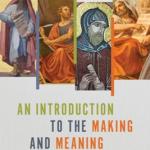Each Wednesday in What Memes Mean, Kirk Bozeman questions the significance, humor, and subtexts of viral videos, memes, and other Internet fads.
Ian and Larissa were very much in love, and from all outward signs their relationship was moving toward marriage. But in 2006, Ian received a traumatic brain injury in a terrible car accident, leaving him in ICU. He eventually made it to rehab and was able to return home, though the effects of the injury were severe and left him in need of constant care. In a moving string of events that followed, Larissa and Ian decided they should get married anyway, and Larissa has been blogging about God’s work in their marriage for quite some time.
The Desiring God blog (one of our Christian subculture-makers) recently featured the online mini-doc above on the site in three parts here, here, and here, using it as a sort of testimonial/advertisement for Piper’s book This Momentary Marriage. (The entire book is available online for free as a PDF, so accusations of tactless plugging for book sales may be somewhat overstated . . . somewhat.) The popularity of Piper’s Desiring God ministry plus readers’ obvious love of the story have pushed the mini-doc viral in the past week, and it was shared and forwarded by countless people all over the Net.
But why did readers love this story so much? Although many have found the modern experience of marriage very frustrating, I think most still harbor a secret hope that marriage can work. Many believe that the idea of the marital institution is dead while sighing loudly and wanting it not to be. Many try to explain divorce rates as simply the result of the inadequacy of an outdated institution, and then belie their true feelings by trying to finagle it into similar options. We want marriage to work, we want to see it succeed. The vast majority of people want to experience the traditional form of marriage and family we so loudly announce as no longer viable.
We share this video because we still want marriage to work. And if a desperate situation like this one can become a place where Christ’s sacrificial love is displayed — where a marriage “working” takes on a new definition entirely — there is hope that perhaps, by God’s grace, the rest of us can pull it off as well.
As a note (one which I add hesitantly), I would also advise the reader to be careful with a beautiful story like this one. Not every pastor would counsel a couple into a union like this – in fact, many would advise against it. Larissa writes that many voices were heavily involved in the decision, and that a judge was required to rule on the issue in court before the marriage could proceed. We should be careful not to make a beautiful story like this prescriptive, which is something evangelicals are especially prone to do.
But it is still a beautiful story, and it communicates something that resonates deeply inside of us. Throughout Scripture, the viability, legitimacy, and necessity of marriage is assumed, with the crowning final thought coming from Paul’s likening of the institution to Christ’s relationship to His church. For the Christian, marriage is more than viable, it is a sacred covenant ordained by God Himself and characteristic of his relationship to His redeemed people. Ian and Larissa’s story is one that intentionally reflects this reality, and for that I am thankful.















